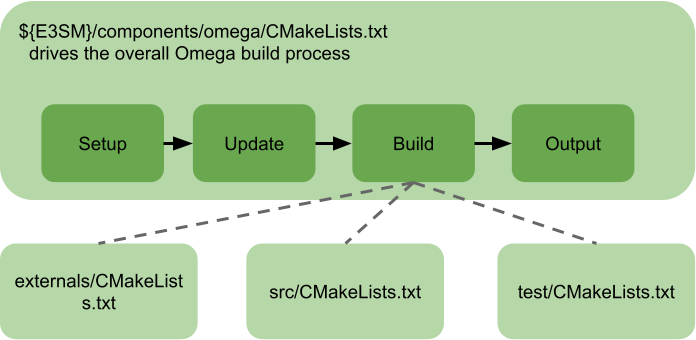Omega Build with CMake
The Omega build system utilizes CMake, a widely-used build tool, to facilitate the build process.
The build process is defined in the CMakeLists.txt file located in the top-level directory of Omega. It consists of four consecutive steps: Setup, Update, Build, and Output.

The build step consists of adding three subdirectories that drive builds for external libraries, the Omega model, and optional tests.
Python is required to use this build system. The version of CMake should be 3.21 or later for supporting HIP.
Step 1: Setup
During this step, the build-controlling variables are configured. The Omega build system supports two modes: standalone and E3SM component. The build mode is automatically detected, and any mode-specific differences are resolved to ensure a consistent build process.
By default, Omega assumes it is part of the E3SM code distribution. In both build modes, the build system collects build-controlling parameters, such as compiler paths and flags, from the E3SM build system.
There are three types of Omega build-controlling variables: Omega, E3SM, and CMake. The names of these variables start with “OMEGA_”, “E3SM_”, and “CMAKE”, respectively. Temporary variables are prefixed with an underscore (“_”).
The following is a list of Omega-specific variables available in this version:
OMEGA_PROJECT_NAME: Name of the project ("OmegaOceanModel")
OMEGA_EXE_NAME: Name of the executable ("omega.exe")
OMEGA_LIB_NAME: Name of the library ("OmegaLib")
OMEGA_BUILD_MODES: List of build modes ("E3SM", "STANDALONE", "NOT_DEFINED")
OMEGA_BUILD_MODE: Selected build mode
OMEGA_BUILD_DIR: Omega top-level build directory
OMEGA_SOURCE_DIR: Directory where the top-level Omega CMakeLists.txt is located
OMEGA_DEFAULT_BUILD_TYPE: Default build type ("Release")
OMEGA_INSTALL_PREFIX: User-defined output directory for the library and executable
OMEGA_ARCH: User-defined programming framework (e.g., "CUDA", "HIP", "OPENMP", "SYCL", "")
OMEGA_CXX_COMPILER: C++ compiler
OMEGA_C_COMPILER: C compiler
OMEGA_Fortran_COMPILER: Fortran compiler
OMEGA_CIME_COMPILER: E3SM compiler name defined in config_machines.xml
OMEGA_CIME_MACHINE: E3SM machine name defined in config_machines.xml
OMEGA_CIME_PROJECT: Slurm account passed to CIME during Omega build
OMEGA_CXX_FLAGS: a list for C++ compiler flags
OMEGA_LINK_OPTIONS: a list for linker flags
OMEGA_BUILD_EXECUTABLE: Enable building the Omega executable
OMEGA_BUILD_TEST: Enable building Omega tests
OMEGA_PARMETIS_ROOT: Parmetis installtion directory
OMEGA_METIS_ROOT: Metis installtion directory
OMEGA_GKLIB_ROOT: GKlib installtion directory
OMEGA_HIP_COMPILER: HIP compiler (e.g., hipcc)
OMEGA_HIP_FLAGS: HIP compiler flags
OMEGA_MEMORY_LAYOUT: Kokkos memory layout ("LEFT" or "RIGHT"). "RIGHT" is a default value.
OMEGA_TILE_LENGTH: a length of one "side" of a Kokkos tile. 64 is a default value.
OMEGA_LOG_LEVEL: a default logging level. "OMEGA_LOG_INFO" is a default value.
OMEGA_LOG_FLUSH: turn on the unbuffered logging. "OFF" is a default value.
OMEGA_LOG_TASKS: set the tasks that generate log file. "0" is a default value.
OMEGA_VECTOR_LENGTH: Vector length used for blocking inner loops for vectorization. "1" is a default value.
E3SM-specific variables
E3SM_SOURCE_DIR: E3SM component directory (${E3SM_ROOT}/components)
E3SM_CIME_ROOT: CIME root directory
E3SM_CIMECONFIG_ROOT: E3SM CIME config directory
E3SM_EXTERNALS_ROOT: E3SM externals directory
E3SM_DEFAULT_BUILD_TYPE: E3SM build type (Release or Debug)
CMake variables
CMAKE_CURRENT_SOURCE_DIR
CMAKE_CURRENT_BINARY_DIR
CMAKE_CURRENT_LIST_DIR
CMAKE_CXX_STANDARD
CMAKE_CXX_COMPILER
CMAKE_CXX_FLAGS
CMAKE_CURRENT_LIST_DIR
CMAKE_BUILD_TYPE
CMAKE_INSTALL_PREFIX
CMAKE_VERSION
Step 2: Update
In this step, CMake is configured, and external library variables, such as Kokkos, MPI, NetCDF, and PNetCDF, are set based on the settings defined in the Setup step. The integrity of the build setup is verified at the end of this step.
Step 3: Build
During this step, the build process is configured. It includes building external libraries, followed by building the Omega main model from source files. Optionally, tests can also be built.
Step 4: Output
The final step, which is optional, involves copying a subset of the build artifacts to designated locations or generating dynamic outputs as needed.
Note: Until the Omega build is integrated into the E3SM build, specific modifications are required to trigger the Omega build within the E3SM build process. Please see Omega Build User Guide for details.